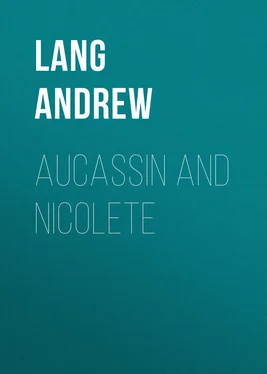Andrew Lang - Aucassin and Nicolete
Здесь есть возможность читать онлайн «Andrew Lang - Aucassin and Nicolete» — ознакомительный отрывок электронной книги совершенно бесплатно, а после прочтения отрывка купить полную версию. В некоторых случаях можно слушать аудио, скачать через торрент в формате fb2 и присутствует краткое содержание. Жанр: foreign_antique, foreign_prose, на английском языке. Описание произведения, (предисловие) а так же отзывы посетителей доступны на портале библиотеки ЛибКат.
- Название:Aucassin and Nicolete
- Автор:
- Жанр:
- Год:неизвестен
- ISBN:нет данных
- Рейтинг книги:3 / 5. Голосов: 1
-
Избранное:Добавить в избранное
- Отзывы:
-
Ваша оценка:
- 60
- 1
- 2
- 3
- 4
- 5
Aucassin and Nicolete: краткое содержание, описание и аннотация
Предлагаем к чтению аннотацию, описание, краткое содержание или предисловие (зависит от того, что написал сам автор книги «Aucassin and Nicolete»). Если вы не нашли необходимую информацию о книге — напишите в комментариях, мы постараемся отыскать её.
Aucassin and Nicolete — читать онлайн ознакомительный отрывок
Ниже представлен текст книги, разбитый по страницам. Система сохранения места последней прочитанной страницы, позволяет с удобством читать онлайн бесплатно книгу «Aucassin and Nicolete», без необходимости каждый раз заново искать на чём Вы остановились. Поставьте закладку, и сможете в любой момент перейти на страницу, на которой закончили чтение.
Интервал:
Закладка:
Andrew Lang
Aucassin and Nicolete
INTRODUCTION
There is nothing in artistic poetry quite akin to “Aucassin and Nicolete.”
By a rare piece of good fortune the one manuscript of the Song-Story has escaped those waves of time, which have wrecked the bark of Menander, and left of Sappho but a few floating fragments. The very form of the tale is peculiar; we have nothing else from the twelfth or thirteenth century in the alternate prose and verse of the cante-fable . 1 1 Gaston Paris, in M. Bida’s edition, p. xii. Paris, 1878. The blending is not unknown in various countries. See note at end of Translation.
We have fabliaux in verse, and prose Arthurian romances. We have Chansons de Geste , heroic poems like “Roland,” unrhymed assonant laisses , but we have not the alternations of prose with laisses in seven-syllabled lines. It cannot be certainly known whether the form of “Aucassin and Nicolete” was a familiar form – used by many jogleors , or wandering minstrels and story-tellers such as Nicolete, in the tale, feigned herself to be, – or whether this is a solitary experiment by “the old captive” its author, a contemporary, as M. Gaston Paris thinks him, of Louis VII (1130). He was original enough to have invented, or adopted from popular tradition, a form for himself; his originality declares itself everywhere in his one surviving masterpiece. True, he uses certain traditional formulae, that have survived in his time, as they survived in Homer’s, from the manner of purely popular poetry, of Volkslieder . Thus he repeats snatches of conversation always in the same, or very nearly the same words. He has a stereotyped form, like Homer, for saying that one person addressed another, “ains traist au visconte de la vile si l’apela” τον δαπαyειβομενος προσεφε.. Like Homer, and like popular song, he deals in recurrent epithets, and changeless courtesies. To Aucassin the hideous plough-man is “Biax frère,” “fair brother,” just as the treacherous Aegisthus is αμυμων in Homer; these are complimentary terms, with no moral sense in particular. The jogleor is not more curious than Homer, or than the poets of the old ballads, about giving novel descriptions of his characters. As Homer’s ladies are “fair-tressed,” so Nicolete and Aucassin have, each of them, close yellow curls, eyes of vair (whatever that may mean), and red lips. War cannot be mentioned except as war “where knights do smite and are smitten,” and so forth. The author is absolutely conventional in such matters, according to the convention of his age and profession.
Nor is his matter more original. He tells a story of thwarted and finally fortunate love, and his hero is “a Christened knight” – like Tamlane, – his heroine a Paynim lady. To be sure, Nicolete was baptized before the tale begins, and it is she who is a captive among Christians, not her lover, as usual, who is a captive among Saracens. The author has reversed the common arrangement, and he appears to have cared little more than his reckless hero, about creeds and differences of faith. He is not much interested in the recognition of Nicolete by her great Paynim kindred, nor indeed in any of the “business” of the narrative, the fighting, the storms and tempests, and the burlesque of the kingdom of Torelore.
What the nameless author does care for, is his telling of the love-story, the passion of Aucassin and Nicolete. His originality lies in his charming medley of sentiment and humour, of a smiling compassion and sympathy with a touch of mocking mirth. The love of Aucassin and Nicolete —
“Des grans paines qu’il soufri,”
that is the one thing serious to him in the whole matter, and that is not so very serious. 2 2 I know not if I unconsciously transferred this criticism from M. Gaston Paris.
The story-teller is no Mimnermus, Love and Youth are the best things he knew, – “deport du viel caitif,” – and now he has “come to forty years,” and now they are with him no longer. But he does not lament like Mimnermus, like Alcman, like Llwyarch Hen. “What is Life, what is delight without golden Aphrodite? May I die!” says Mimnermus, “when I am no more conversant with these, with secret love, and gracious gifts, and the bed of desire.” And Alcman, when his limbs waver beneath him, is only saddened by the faces and voices of girls, and would change his lot for the sea-birds. 3 3 “Love in Idleness.” London, 1883, p. 169.
“Maidens with voices like honey for sweetness that breathe desire,
Would that I were a sea-bird with limbs that never could tire,
Over the foam-flowers flying with halcyons ever on wing,
Keeping a careless heart, a sea-blue bird of the spring.”
But our old captive, having said farewell to love, has yet a kindly smiling interest in its fever and folly. Nothing better has he met, even now that he knows “a lad is an ass.” He tells a love story, a story of love overmastering, without conscience or care of aught but the beloved. And the viel caitif tells it with sympathy, and with a smile. “Oh folly of fondness,” he seems to cry, “oh merry days of desolation”
“When I was young as you are young,
When lutes were touched and songs were sung,
And love lamps in the windows hung.”
It is the very tone of Thackeray, when Thackeray is tender, and the world heard it first from this elderly, nameless minstrel, strolling with his viol and his singing boys, perhaps, like a blameless d’Assoucy, from castle to castle in “the happy poplar land.” One seems to see him and hear him in the twilight, in the court of some château of Picardy, while the ladies on silken cushions sit around him listening, and their lovers, fettered with silver chains, lie at their feet. They listen, and look, and do not think of the minstrel with his grey head and his green heart, but we think of him. It is an old man’s work, and a weary man’s work. You can easily tell the places where he has lingered, and been pleased as he wrote. They are marked, like the bower Nicolete built, with flowers and broken branches wet with dew. Such a passage is the description of Nicolete at her window, in the strangely painted chamber,
“ki faite est par grant devisse
panturee a miramie.”
Thence
“she saw the roses blow,
Heard the birds sing loud and low.”
Again, the minstrel speaks out what many must have thought, in those incredulous ages of Faith, about Heaven and Hell, Hell where the gallant company makes up for everything. When he comes to a battle-piece he makes Aucassin “mightily and knightly hurl through the press,” like one of Malory’s men. His hero must be a man of his hands, no mere sighing youth incapable of arms. But the minstrels heart is in other things, for example, in the verses where Aucassin transfers to Beauty the wonder-working powers of Holiness, and makes the sight of his lady heal the palmer, as the shadow of the Apostle, falling on the sick people, healed them by the Gate Beautiful. The Flight of Nicolete is a familiar and beautiful picture, the daisy flowers look black in the ivory moonlight against her feet, fair as Bombyca’s “feet of carven ivory” in the Sicilian idyll, long ago. 4 4 Theocritus, x. 37.
It is characteristic of the poet that the two lovers begin to wrangle about which loves best, in the very mouth of danger, while Aucassin is yet in prison, and the patrol go down the moonlit street, with swords in their hands, sworn to slay Nicolete. That is the place and time chosen for this ancient controversy.
Интервал:
Закладка:
Похожие книги на «Aucassin and Nicolete»
Представляем Вашему вниманию похожие книги на «Aucassin and Nicolete» списком для выбора. Мы отобрали схожую по названию и смыслу литературу в надежде предоставить читателям больше вариантов отыскать новые, интересные, ещё непрочитанные произведения.
Обсуждение, отзывы о книге «Aucassin and Nicolete» и просто собственные мнения читателей. Оставьте ваши комментарии, напишите, что Вы думаете о произведении, его смысле или главных героях. Укажите что конкретно понравилось, а что нет, и почему Вы так считаете.












